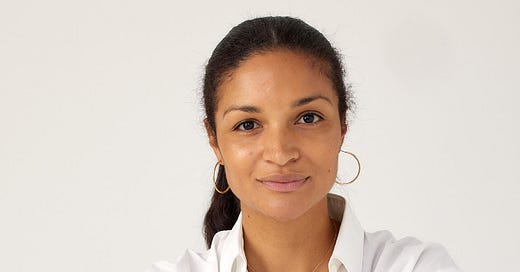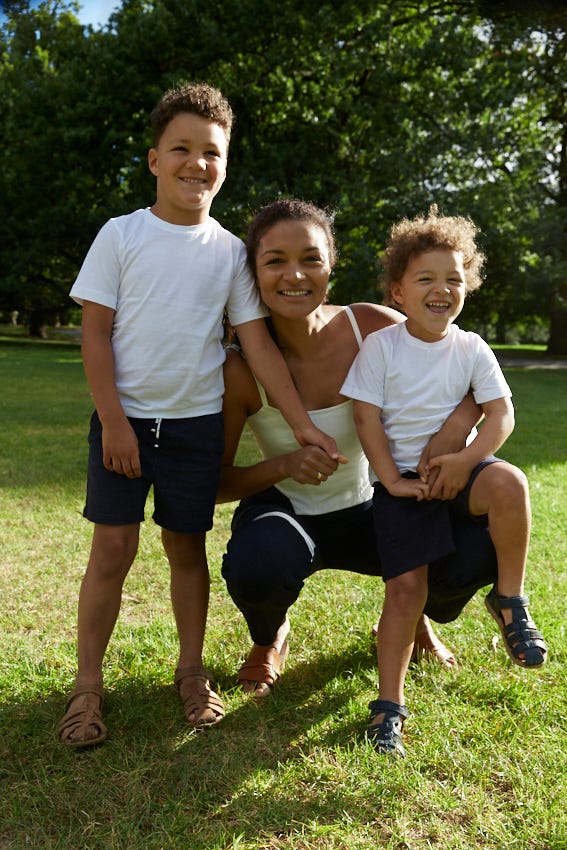Motherhood Identity Series with Leonie Akhidenor, founder & host of Parenthood Podcast
From working in management consulting to creating a top-rated parenting podcast in Australia, this entrepreneur is making her dreams a reality.
If you—like us—tune-in to parenting podcast to drown out the over-stimuatlion of prepping dinner with a toddler or baby in tow, you’ve probably heard of this week’s guest for the Motherhood Identity Series.
Leonie Akhidenor, an Australian dynamic entrepreneur and mother of two, transitioned from a successful career in management consulting at Ernst & Young to running her family’s property development and construction business. Then, inspired by her personal experiences and the birth of her second child, Charlie, Leonie launched the Parenthood Podcast.
Last year it was ranked in the top three in the Australian parenting podcast category—and it broke into the top 100 of all Australian podcasts.
Leonie's story is one of resilience and adaptability, shaped by her upbringing in a migrant family and her journey through pre and postpartum depression. She offers insights into couple dynamics, parenting challenges in Australia, and the impact of parenthood on mental health.
Through her podcast, she explores common struggles and shares practical tips to help parents navigate their journey. Join us as we explore Leonie's path of balancing entrepreneurship with motherhood, her views on raising a biracial family, and the strategies she employs to reclaim her identity and sense of self amidst the demands of parenting.
Can you share with us how your childhood experiences, described as a "cocktail of emotions," have influenced your approach to motherhood and parenting?
I was brought up by migrant parents, so my childhood was a cocktail of emotions. I was part of a close-knit family unit but was also exposed to the main stresses my parents experienced; financial stress, the stress of starting a business in a new country etc. I had to grow up fast. There was also an expectation, like for many migrant children, to excel in most areas. So, I would achieve and feel good about myself, but when I didn’t achieve it would impact my self-worth.
Having experienced pre-and postnatal-depression yourself, how do you think your own upbringing contributed to your mental health challenges during those times?
I grew up with a lot of anxiety, to excel, to be the good girl, to not be problematic for my parents who were dealing with a lot. Given they were starting a new life in Australia. That anxiety has stayed with me for most of my life. When I fell pregnant many of the complex emotions that I had buried came to the surface and mixed with hormones manifested in depression. My body felt exhausted and had nothing left to give.
As the host of the Parenthood Podcast, what aspects of couple dynamics—especially those with children—fascinate you the most?
How a lack of physical intimacy and affection exists once we’ve had children and how we can get it back. This was one of the most unexpected aspects to parenthood for me and often when I speak about this so many parents seem relieved to realize they are not the only ones experiencing this.
I also find common behaviors like resentment relationships and how this can build when one partner (or both) feels under-appreciated or flooded by the mental load etc is interesting.
After hundreds of conversations with parents over four years, there are some practical tips in overcoming these hurdles that are relevant to most. The final thing I’ve found fascinating is how common a lot of our experiences are as parents and the beauty of a podcast is that sharing these experiences makes us feel less alone in our struggles.
What do you perceive as the most significant challenges facing Australian parents today, and how do you think they can be addressed?
Cost of living crisis: with inflation at an all-time high, the cost of everyday goods have soared, leading to financial pressure for many Australian families. How do we overcome this? By actively budgeting as a family, buying in bulk when sales are on, structuring our bank accounts to streamline visibility of our expenditure (inspired by The Barefoot Investor), utilizing rewards programs at supermarkets/ airlines etc.
Lack of affection in our relationships: Can be overcome by making time for ourselves a priority. Once we fill up our own cups, we then have more to give to our partners. Another key tip is making time with your partner for childfree dates, this could be Uber eats at home, or a restaurant, or a walk.
We are often so swept up in the children’s needs that it’s easy to lose connection as a couple, time alone helps to build this back. Also instigating small acts of affection so we can break out of the ‘room-mate’ dynamic with our partners i.e., kiss hello and kiss goodbye, kitchen cuddles, snuggling when on the couch, these small deliberate acts can often support in bigger acts to follow.
Think about your partner’s love language and lean into that. Lastly if you’re not feeling sexy, then communicating that with your partner, acknowledging it can often help.
How do you believe parenthood impacts our mental health, and what strategies do you recommend for overcoming challenges and reclaiming one's identity?
Parenthood can impact our mental health due to the lack of time we have for ourselves and the huge amount of time and responsibility we have for our children. We can feel suffocated by the mental load, all the things that we need to do on the daily to keep the household running.
Self-care, time with our partners etc. often goes out the window particularly in early parenting as you navigate your new normal. Lack of sleep compounds our complicated emotions.
Hence our sense of identity can shift immensely, as we figure out who we are now we are a parent.
In reclaiming our identity, I always recommend making time for what you love, even if it’s just 15 minutes. 15 minutes to read a book in the sun, go for a walk, meditate, journal, have a bath, listen to a podcast, on a regular basis can start the shift from us being flooded to us starting to acknowledge our own feelings and needs. When we make this time, we can then start to determine what we want to spend time doing, what our priorities are and who we want to be moving forward.
As someone who grew up in a multi-racial, migrant family, how has this background shaped your approach to parenting and your views on identity?
One of my key values is respect, respect to everyone regardless of what they look like, what they’re going through, how they approach me. I hope to instill this in my boys also. Because my parents were up against it, being a bi-racial couple in the 1980’s, in my dad’s case being a man of color, being migrants and having very little when they came to Australia. They experienced a degree of judgement and disrespect. So, it is so critical to me and my parenting that we never judge and we always aim to support others and respect where they’re at in their journeys.
Balancing entrepreneurship with motherhood must be demanding. Can you tell us about your journey in managing three businesses and a side hustle while navigating the responsibilities of motherhood?
I currently manage two businesses: property development business and Parenthood podcast. I also model, have had a coaching and strategy business, but I find that currently with two businesses is the most I can handle, given household demands. I juggle it all (or try to!) by being very organized.
I wake up at 5 a.m. every weekday, write my to-do list for the day and then commence working. I’m very structured with my time and I also play to my strengths. I know I’m most motivated in the mornings so my hardest tasks that require the most amount of thinking happen early. Later on in the day I do the more creative work; podcasting, social media for podcast etc. If I have a plan I often feel more in control.
Anything else to add about your mothering experience and how it's impacted your identity and sense of self?
After experiencing postnatal depression for the second time round, I had a rock bottom moment. I was contemplating life and how I was living it. Whether I was even happy and what I wanted the future to look like. That is when I started Parenthood podcast.
Something I would never have previously contemplated, because I was always focused on spending my time on things that would be commercially viable/ provide me with an income. So, until then I went to the top uni, did the safe job and that did not involve any creativity.
As I child I’d always wanted to be an actress, so in my rock bottom moment I leant into that and started a podcast, a creative outlet. I spent time and energy on something that made me no income, nor was I looking for financial return from it. My new identity was born. I went back to work as a property developer and continued the podcast as a passion, working weekends and early mornings to juggle it all.
Years on the podcast has led to many opportunities in the mainstream Australian media, modeling campaigns and sponsorship deals. My identity changed from playing it safe, to prioritizing the things that feed my soul (whilst having my full-time job, because lets be real, we’ve got to pay the bills!). Motherhood changed me for the better.






